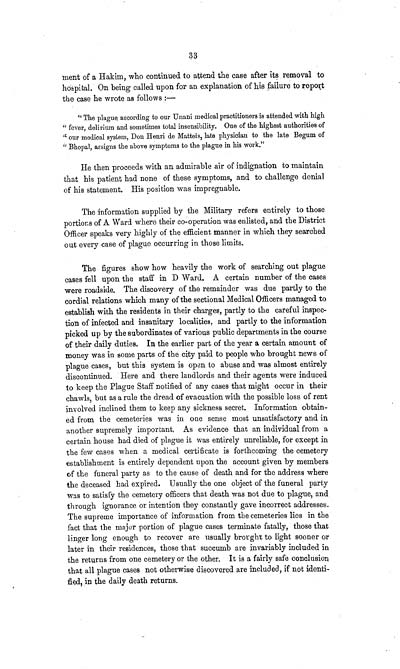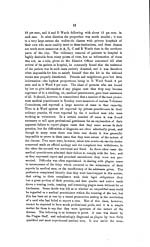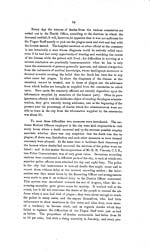Medicine - Disease > Report of the Municipal Commissioner on the plague in Bombay for the year ending 31st May... > Volume 1
(45) Page 33
Download files
Individual page:
Thumbnail gallery: Grid view | List view

33
ment of a Hakim, who continued to attend the case after its removal to
hospital. On being called upon for an explanation of his failure to report
the case he wrote as follows :-
"The plague according to our Unani medical practitioners is attended with high
"fever, delirium and sometimes total insensibility. One of the highest authorities of
" our medical system, Don Henri de Matteis, late physician to the late Begum of
"Bhopal, assigns the above symptoms to the plague in his work."
He then proceeds with an admirable air of indignation to maintain
that his patient had none of these symptoms, and to challenge denial
of his statement. His position was impregnable.
The information supplied by the Military refers entirely to those
portions of A Ward where their co-operation was enlisted, and the District
Officer speaks very highly of the efficient manner in which they searched
out every case of plague occurring in those limits.
The figures show how heavily the work of searching out plague
cases fell upon the staff in D Ward. A certain number of the cases
were roadside. The discovery of the remainder was due partly to the
cordial relations which many of the sectional Medical Officers managed to
establish with the residents in their charges, partly to the careful inspec-
tion of infected and insanitary localities, and partly to the information
picked up by the subordinates of various public departments in the course
of their daily duties. In the earlier part of the year a certain amount of
money was in some parts of the city paid to people who brought news of
plague cases, but this system is open to abuse and was almost entirely
discontinued. Here and there landlords and their agents were induced
to keep the Plague Staff notified of any cases that might occur in their
chawls, but as a rule the dread of evacuation with the possible loss of rent
involved inclined them to keep any sickness secret. Information obtain-
ed from the cemeteries was in one sense most unsatisfactory and in
another supremely important. As evidence that an individual from a
certain house had died of plague it was entirely unreliable, for except in
the few cases when a medical certificate is forthcoming the cemetery
establishment is entirely dependent upon the account given by members
of the funeral party as to the cause of death and for the address where
the deceased had expired. Usually the one object of the funeral party
was to satisfy the cemetery officers that death was not due to plague, and
through ignorance or intention they constantly gave incorrect addresses.
The supreme importance of information from the cemeteries lies in the
fact that the major portion of plague cases terminate fatally, those that
linger long enough to recover are usually brought to light sooner or
later in their residences, those that succumb are invariably included in
the returns from one cemetery or the other. It is a fairly safe conclusion
that all plague cases not otherwise discovered are included, if not identi-
fied, in the daily death returns.
ment of a Hakim, who continued to attend the case after its removal to
hospital. On being called upon for an explanation of his failure to report
the case he wrote as follows :-
"The plague according to our Unani medical practitioners is attended with high
"fever, delirium and sometimes total insensibility. One of the highest authorities of
" our medical system, Don Henri de Matteis, late physician to the late Begum of
"Bhopal, assigns the above symptoms to the plague in his work."
He then proceeds with an admirable air of indignation to maintain
that his patient had none of these symptoms, and to challenge denial
of his statement. His position was impregnable.
The information supplied by the Military refers entirely to those
portions of A Ward where their co-operation was enlisted, and the District
Officer speaks very highly of the efficient manner in which they searched
out every case of plague occurring in those limits.
The figures show how heavily the work of searching out plague
cases fell upon the staff in D Ward. A certain number of the cases
were roadside. The discovery of the remainder was due partly to the
cordial relations which many of the sectional Medical Officers managed to
establish with the residents in their charges, partly to the careful inspec-
tion of infected and insanitary localities, and partly to the information
picked up by the subordinates of various public departments in the course
of their daily duties. In the earlier part of the year a certain amount of
money was in some parts of the city paid to people who brought news of
plague cases, but this system is open to abuse and was almost entirely
discontinued. Here and there landlords and their agents were induced
to keep the Plague Staff notified of any cases that might occur in their
chawls, but as a rule the dread of evacuation with the possible loss of rent
involved inclined them to keep any sickness secret. Information obtain-
ed from the cemeteries was in one sense most unsatisfactory and in
another supremely important. As evidence that an individual from a
certain house had died of plague it was entirely unreliable, for except in
the few cases when a medical certificate is forthcoming the cemetery
establishment is entirely dependent upon the account given by members
of the funeral party as to the cause of death and for the address where
the deceased had expired. Usually the one object of the funeral party
was to satisfy the cemetery officers that death was not due to plague, and
through ignorance or intention they constantly gave incorrect addresses.
The supreme importance of information from the cemeteries lies in the
fact that the major portion of plague cases terminate fatally, those that
linger long enough to recover are usually brought to light sooner or
later in their residences, those that succumb are invariably included in
the returns from one cemetery or the other. It is a fairly safe conclusion
that all plague cases not otherwise discovered are included, if not identi-
fied, in the daily death returns.
Set display mode to: Large image | Zoom image | Transcription
Images and transcriptions on this page, including medium image downloads, may be used under the Creative Commons Attribution 4.0 International Licence unless otherwise stated. ![]()
| India Papers > Medicine - Disease > Report of the Municipal Commissioner on the plague in Bombay for the year ending 31st May... > Volume 1 > (45) Page 33 |
|---|
| Permanent URL | https://digital.nls.uk/74575180 |
|---|




